![Fine, Milo: Ikebana: London Encounters 2003 [2 CDs] (Emanem) Fine, Milo: Ikebana: London Encounters 2003 [2 CDs] (Emanem)](https://www.teuthida.com/productImages/misc2/miloFineIkebana.jpg)
Out of Stock
Quantity in Basket: None
Log In to use our Wish List
Shipping Weight: 4.00 units
Sample The Album:
Milo Fine-Clarinets, Piano, Drum Set
Angharad Davies-Violin
Charlotte Hug-Viola
Sarah Gail Brand-Trombone
Hugh Davies-Invented Instruments
Marcio Mattos-Cello, doublebass
Marj Mcdaid-Voice
Matt Hutchinson-Synthesizer & Electronics
Paul Shearsmith-Pocket Trumpet
Philipp Wachsmann-Violin & Electronics
Simon H Fell-doublebass
Tony Wren-doublebass
Click an artist name above to see in-stock items for that artist.
UPC: 5030243421329
Label: Emanem
Catalog ID: 4213
Squidco Product Code: 4367
Format: 2 CDs
Condition: New
Released: 2004
Country: Great Britain
Packaging: 2 CDs in a single Jewel tray, not sealed
Digital concert recording - London by Milo Fine - 2003 APRIL 2, APRIL 9, MAY 7
"In 2003, multi-instrumentalist Milo Fine, the leading light of the Minneapolis improvising scene, made his second visit to London. During his extended stay, Milo Fine performed at several gigs and private sessions with quite a few of the members of the London improvising scene. Two appearances have already made it to CD - the very first gig, a duo with Derek Bailey (EMANEM 4099), and the FREEDOM OF THE CITY set (with Hugh Davies, Paul Shearsmith and Tony Wren) (EMANEM 4212).
The bulk of the material on this double CD ... comes from the Free Radicals series that Tony Wren curates at the Red Rose on the first Wednesday of the month. And while the final choice for personnel was left to Fine, Wren offered suggestions which inadvertently led to the inclusion of the London Bass Trio (in April) and Quatuor Encorde (in May). But, rather than formal groups, Fine preferred to have all the musicians on stage at once, allowing for their experience and sensibilities to form various groupings according to the dictates of the moment."
Artist Biographies
• Show Bio for Milo Fine "The Milo Fine Free Jazz Ensemble was founded as Blue Freedom by Milo Fine (with Scott Munsell and Steve Dokken) in 1969. During the next six years, a procession of musicians, including Gary Matala, Dean Granros, Rick Barbeau, Greg Anderson, Joe Smith, Dave Madson, Jeff Johnson (the jazz bassist), Dwight (Richard) Marriott, Spencer MacLeish, Gary Knox, Tom Lewis, Carei Thomas, Michael Yonkers, Mark Maistrovich, Anthony Cox, Scott Newell, Curtis Wenzel, John O'Brien, and Nick Radovich passed through the group as its name changed to Blue Freedom's New Art Transformation, and, in 1973, the Ensemble. Two years later (1975), after an introduction arranged by Newell, Fine teamed up with Steve Gnitka to become the Ensemble's nucleus. The core of Milo's public appearances in the Twin Cities have been rooted in self-determination. From 1970-2013, he produced a continuous series of concerts at eight Minneapolis venues; the most respectful and welcoming being Homewood Studios. (However, thanks to departing executive director David Alderson, the last 8 years or so at the West Bank School of Music were extremely pleasant as well.) Starting in 2014, these concerts are ongoing at his home-based Studio Toile d'Angles. In addition to these series', and other Minneapolis/St. Paul performances, which have involved collaborations with Newell, O'Brien, Cox, Lane Ellwanger, Pam Scheiner, Jason S. Shapiro, Elliot Fine, Nathan Smith, Davu Seru, Andrew Lafkas, Charles Gillett, Derek Bailey, Dave Stone and others, Milo and Steve have, as a duo, and in tandem with other musicians (the group Borbetomagus, André Jaume, Wolfgang Dauner, Amy Sheffer, Raymond Boni, Joe McPhee, et. al.) presented their work in France, Germany, Switzerland, and New York. Milo has also appeared in Chicago with Gutter Cleaners (1982-1992), an improvisational music/movement duo he co-founded with dancer Susan J Sperl; in London as a participant in Company Week '88 curated by Derek Bailey, where he collaborated with over a dozen musicians, including Bailey, Lol Coxhill, Peter Kowald, Gavin Bryars, Conrad Cook, LaDonna Smith, and Dennis Palmer; and in Austria (1996/1997) as a member of the Reform Art Unit, with Fritz Novotny, Sepp Mitterbauer, Walter Malli, Paul Fields, Karl Wilhelm Krbavac, Sandro Miori, et. al. (At the time, he thought he was an RAU member for the duration of the short tour in '97. In 2014, however, he was informed that, from that time on, he was actually considered a bona fide member of the group, and its overarching "reformARTmusic" umbrella.) He returned to England (London, Sheffield, and Leeds) in 2003 for a six and a half week intensive, participating in sixteen private and public events - including an appearance at the Freedom Of The City festival - with thirty-one musicians. These artists included two (Tony Wren and Marj McDaid) he initially worked with in 1982 when they visited Minneapolis/St. Paul, eight (Paul Shearsmith, Paul Hession, John Jasnoch, Charlie Collins, Alex Ward, Mick Beck, Alan Wilkinson, and Roger Turner) he first met and/or played with at Company Week '88, as well as Bailey, Phil Wachsmann, Matt Hutchinson, Hugh Davies, Gail Brand, Alex Ward, Marcio Mattos, Sunny Murray, John Edwards, Tony Bevan, and John Russell. 2004 found Milo traveling to Wesleyan University (Connecticut) where, in addition to presenting a concert (with Andrew Raffo Dewar and Lafkas), he conducted a workshop and colloquium, and joined Anthony Braxton for a recording session. The aforementioned trio then went on to present concerts in Baltimore and Philadelphia. (For the latter event, they were joined by Jonathan Fretheim.) Milo's other work outside of the Ensemble includes, in the 70s and 80s, being a periodic collaborator in Newell's groups - Reykjavik Gold and the Keith Miller Trio (aka Newell/Miller/[Tom] Prideaux) - as well as O'Brien's ensembles (often with Gnitka.) Additionally, during that time he occasionally partnered with Scheiner, Jean Decker, et. al. He also recorded with the Teenage Boatpeople (led by Jeff Johnson; not the jazz bassist), Gordon Heimer, Walter Zuber Armstrong, Borbetomagus, and, in 1999, the Gorge Trio. (Public appearances in these configurations were, in the case of the Boatpeople, periodic for a couple years in the late 70s/early 80s; in the case of the Gorge Trio, nonexistent; and, for the remainder, one-time events, though Groid, an offshoot of Gordon Heimer, featuring Milo and Terry Ingram, presented their work regularly for nearly two years.) From 2000-2005, Milo worked in a variety of groups with Seru, Lafkas, Gillett, Jack Wright, Ed Rodriguez, N. Smith, O'Brien, Cox, E. Fine and others. One of these groups, the trio Discussion Unit, was the direct result of Milo's reestablishing contact with Anthony Cox in 2003 after more than two decades. With Seru replacing J. T. Bates in 2005, the group became Charcoal, which, as part of the 2006 Minnesota sur Seine festival, collaborated with Evan Parker. (Three years after its founding, Charcoal became a quartet with the addition of Stefan Kac; and then, unofficially disbanded when Stefan left for the west coast in 2011.) In 2007 and 2008, Milo partnered with Roger Turner for a concert, Tim Hodgkinson for a recording session, and Didier Petit for an '08 Minnesota sur Seine festival set. (Milo convened a trio with Didier and Viv Corringham - who he first met in London in 2003, and began working with the subsequent year when she moved to Minnesota - for a recording session in 2009, and a concert in 2010.) 2007 also marked the founding of the short-lived Trio Raro: Milo, Dewar, and Seru. Two-thirds of that trio (Milo and Davu) collaborated with Taylor Ho Bynum for a 2009 concert, and that same year found Jeff Johnson reactivating the Teenage Boatpeople with Tim Mauseth as the third member, and the beginning of ongoing collaborations with Paul Metzger and Elaine Evans. Milo returned to Vienna, Austria in 2010 for a recording session and concert with the Reform Art Orchestra (Subwayart_3). With an in-depth interview, private session, recording sessions and a concert, 2010 also saw the start of an ongoing collaboration with multi-instrumentalist/academician Erkki Huovinen. And 2015 marked his reestablishing contact with Wright in a trio instituted by Seru. That same year, Milo brought Reform Art Unit founding members Fritz Novotny and Sepp Mitterbauer to Minneapolis for 3 concerts at Studio Toile d'Angles. 2016 found Milo in Hamburg, Germany (with Lafkas and percussionist Chad Popple), and Vienna & Gmunden, Austria (with the reformARTclassic sextet: Novotny/Fields/Alaeddin Adlernest/Krbavac/Raoul Herget; and a reformARTwest quartet: Novotny/Adlernest/Karl Vößner), along with 2 days of reformARTorchestra small group recording sessions for the "Improcomposer Opera" LP. He returned to Austria in 2018 as part of Three Motions (with Novotny and Fields) and the reformARTseven (Novotny/Fields/Herget/Johannes Groysbeck/Rina Chandra/Franz Koglmann) for concerts in Gmunden and Vienna. Thanks to the initiative of Seru, 2018 also saw the (sporadic) resurgence of Charcoal. Noteworthy Minneapolis/St. Paul collaborators from 2006 or so to 2017 include Seru, Gillett, Evans, Metzger, Kac, Bryce Beverlin II, Daniel Furuta, Joseph Damman, Newell, O'Brien, Corringham, J. Smith, Cox, Aerosol Pike (Philip Mann/Ryan Reber/Rick Ness), the Boatpeople, Kevin Cosgrove, Sam Wildenauer, and Benjamin J Mansavage Klein. 2013 found Corringham moving to New York, Huovinen returning to Finland and Gnitka & O'Brien effectively curtailing their public performances. In 2017, Milo began collaborating with soprano saxophonist Emerson Aagaard, and, in a rare turn of events, was approached by choreographer Leyya Mona Tawil to participate in her piece DESTROY//Minneapolis. 2019 found Milo in a solo setting concluding the decade-long Sonic Frontiers Concert Series at the University of Alabama curated by Dewar. With Wildenauer and Aagaard stepping back from music and improvised music respectively in 2020, Milo's most frequent collaborators now include Gillett, Evans, Damman, Klein, Furuta, Seru, Beverlin II, Cosgrove, Metzger, and, logistics permitting, Popple, Dewar, and Lafkas. Additionally there are occasional concerts with Cox, Jeff Johnson (the Boatpeople, now a duo with guests), and poets George Roberts & Michael Mann. The Reform Art Orchestra (Anyone who bothers to make their way through this maze of personal/professional relationship dynamics will note that it is primarily just that. Overall, these interfacings are of greater import to Milo than the many venues he's played outside those which house his focus on self-determination, the meagre funding he's rarely managed to procure, or the odd residency and other collaborative ventures (i.e.; dance, theater) which occur from time-to-time. (Much of this information does, however, and of course, find its way into formal resumés utilized in conjunction with his mainly futile attempts to procure funding; an activity, which, for Milo, is fraught with ambivalence and untenability, which is not surprising, as these attributes are integral components of his world view.) Born 1/22/52, Milo has played drums since 1961 (informal studies with Elliot Fine); piano since 1966 (studies with James Allen 1966-67); b flat clarinet since 1974; alto clarinet since 1992; and e flat clarinet since 2002. (He also played bass clarinet from 1989-1997.) His initial contact with the marimba was in 1959, and he returned to it in 1990. In 1980, Milo invented the m-drums, a percussion kit made up of "found objects", broken cymbals, and the like attached to a practice pad set. In 1987 this kit evolved into the m-drums II, which incorporated low tech/analogue electronics, and was "retired" in 2015. (He also utilizes analogue electronics with the b flat clarinet and electronic keyboards.)" ^ Hide Bio for Milo Fine • Show Bio for Angharad Davies "Angharad Davies is a violinist, one at ease in both improvising and composition, with a wide discography as part of varied range of ensembles and groups. She's a specialist in the art of 'preparing' her violin, adding objects or materials to it to extend its sound making properties. Her sensitivity to the sonic possibilities of musical situations and attentiveness to their shape and direction make her one of contemporary music's most fascinating figures. 2015 has seen her being commissioned for a new work at the Counterflows Festival, Glasgow and premiering Eliane Radigue's new solo for violin, Occam XXI at the El Nicho Festival, Mexico. She's performed at, the Queen Elizabeth Hall, BBC Proms, Music We'd Like to Hear's concert series, is an associate artist at Cafe Oto, is a member of Apartment House, Cranc and Common Objects, been artist in residence at Q-02, and played live with Tony Conrad in the Turbine Room at the Tate Modern. Other collaborations have featured the likes of John Butcher, Daniela Cascella, Rhodri Davies, Julia Eckhardt , Kazuko Hohki, Roberta Jean, Lina Lapelyte, Dominic Lash, Tisha Mukarji, Andrea Neumann, Rie Nakajima, Tim Parkinson, J.G.Thirlwell, Stefan Thut, Paul Whitty, Manfred Werder, Birgit Ulher, Taku Unami and she's released records on Absinth Records, Another Timbre, Potlatch and Confrontrecords." ^ Hide Bio for Angharad Davies • Show Bio for Charlotte Hug "Charlotte Hug: musician (viola & voice), composer, teacher, media artist, visual artist, Hug´s innovative musical-visual solo performances in distinctive locations and her interdisciplinary work have created an international furore. She has played in locations such as the tunnels of the Rhône glacier, the House of Detention, an underground former prison in London, a half-demolished bunker in Humboldthain Berlin, the hot healing springs in the spa town of Baden and the dockyard in Coph on the Irish Atlantic coast. This musician of the extreme is constantly pushing the boundaries of her instrument and has reinvented the viola - and this with an instrument built by the Viennese violin maker J.G Thir in 1763 . She has developed a number of techniques, including the "soft bow technique", which enables her to play up to eight voices. Hug´s speciality is also a blend of viola and vocals, which has given rise to her distinctive tonal language. In the visual arena, as well as in a musical context, Hug´s sound-drawings "Son-Icons" have found international recognition. These she has used to develop her own compositional method. Hence her spatial and video-scores ranging from solo pieces to orchestra works, such as the orchestral work "Nachtplasmen" for Son-Icons and video-score, which was premiered with the Lucerne Festival Academy in 2011. She has had solo exhibitions at venues such as Swissnex San Francisco, the Sirius Arts Centre Cobh, Cork in Ireland and the Museum of Art Lucerne. Hug is also fully active as a concert performer, soloist, composer and conductor of her own works at major festivals inEurope, North America, Latin America and Canada, such as Tage für Neue Musik Zurich, Donaueschinger Musiktage, Berliner Festspiele MaerzMusik, San Francisco International Arts Festival. Her extensive discography, including three solo CDs, as well as improvised music from international collaborations is distributed worldwide by important labels. There are collaborations with international greats, such as the photographer and film maker Alberto Venzago, the theatre and opera director Jossie Wieler, concerts with artists such as Joan Jeanrenaud from the Kronos Quartet, Maggie Nicols, Barry Guy, Phil Minton, Larry Ochs, Evan Parker, Elliott Sharp, etc. Hug gives master classes in improvisation and "instant composing". She also gives lectures and performance lectures in the field of "Transdisciplinarity in the Arts". She is a visiting professor at several universities and art academies including McGill University Montreal, CNMAT of the University of California Berkeley and The School of the Art Institute of Chicago. Since 2008 she has held the post of lecturer at the Zurich University of the Arts in interdisciplinary studies. Hug lives in Zurich and on the road. Having completed her studies in fine arts and music, she received various awards and composition commissions, from organisations such as Pro Helvetia, Lucerne Festival, etc. She has been "artist in residence" in London, Paris, Cork 2005 Capital of Culture, and in Berlin. In 2006 she was awarded the city of Zurich prize for composition. In 2011 she was "artiste étoile" at the Lucerne Festival." ^ Hide Bio for Charlotte Hug • Show Bio for Sarah Gail Brand "Sarah Gail Brand: trombonist composer arranger tutor workshop leader. Born in London, 1971. Described by The Wire magazine as the most exciting trombone player for years, Sarah Gail Brand has recorded and performed on the international Jazz and Improvised Music since the early 1990s with Mark Sanders, John Edwards, Martin Hathaway, Billy Jenkins, Elton Dean, Evan Parker, Phil Minton, Lol Coxhill, Alexander Hawkins, Maggie Nicols, Rachel Musson, Wadada Leo Smith, Jason Yarde, Steve Beresford and countless others. She appears in Stewart Lee's Comedy Vehicle, series 1 & 2 (BBC TV) and with Stewart in the 2014 documentary film Taking the Dog for a Walk. Current ongoing performing projects include: Brand/Sanders duo with Mark Sanders (drums); Deep Trouble Trio with Paul Rogers (7 string double bass) and Mark Sanders (drums); Brand/Beresford/Edwards/Sanders (Steve Beresford- electronics, piano,John Edwards- double bass) This ensemble also works as a quartet with Mark Sanders (drums) SGB Sextet: SGB (trombone), Nicholas Malcolm (trumpet), Martin Hathaway (reeds), Liam Noble (piano), Dave Whitford (double bass) Mark Sanders (drums) Rosenblatt with Sam Eastmond: SGB (trombone), Hannah Marshall (cello), Mick Foster (bass clarinet), Moss Freed (guitar), Mark Lewandowski (double bass), Will Glaser (drums). Sarah's composing credits include an original score for the Charlie Chaplin classic Easy Street, premiered at the Barbican Cinema, London in 2013; incidental music for the 2014 short Low Down Alley Blues; We Should Consider The Possibility- Piece for Improvising Ensemble and Chamber Orchestra, premiered by the Guildhall Improvised Music Ensemble and the Southbank Sinfonia in 2014. Sarah was a guest presenter on Jazz on 3 (BBC Radio 3) 2009-2016, is a professor of Improvisation at the Guildhall School of Music and Drama, London, and a qualified Music Therapist. Sarah is currently studying for her PhD in Improvised Music at Canterbury Christ Church University, Kent." ^ Hide Bio for Sarah Gail Brand • Show Bio for Hugh Davies "Hugh Seymour Davies (23 April 1943 - 1 January 2005) was a musicologist, composer, and inventor of experimental musical instruments. Davies was born in Exmouth, Devon, England. After attending Westminster School, he studied music at Worcester College, Oxford from 1961 to 1964. Shortly after he travelled to Cologne, Germany to work for Karlheinz Stockhausen as his personal assistant. For two years, he assembled and documented material for Stockhausen's compositions and was a member of his live ensemble. From 1968 to 1971 Davies played in The Music Improvisation Company. The group's guitarist Derek Bailey later wrote that "the live electronics served to extend the music both forwards and backwards (...) Davies helped to loosen what had been, until his arrival, a perhaps too rarified approach". He was also a member of the group Gentle Fire, active from 1968 to 1975, which specialised in the realisation of indeterminate and mobile scores, as well as verbally formulated intuitive-music compositions (such as Stockhausen's Aus den sieben Tagen) and in the performance of its own Group Compositions. Davies invented musical instruments that he constructed from household items. Among them was the shozyg, a generic name he used for any instrument housed inside an unusual container. The name is derived from the first of such instruments, which was housed inside the final volume of an encyclopaedia (covering the subjects from SHO- to ZYG-). From the 1960s onwards Davies made very significant contributions to the documentation of electronic music history, and in 1968 published a catalogue in which he listed - ostensibly - all the works of electronic music ever composed worldwide. It has been argued that, through his research and documentation, Davies characterised electronic music for the first time as a truly international, interdisciplinary field. Davies was also a member of the Artist Placement Group during the mid-1970s. Davies was the founder and first Director of the Electronic Music Studios at Goldsmiths, University of London from 1968 to 1986 and was subsequently a researcher there until 1991. Davies had been a part-time Researcher and Lecturer in Sonic Art at the Centre for Electronic Arts, Middlesex University, London from 1999 until the end of his life." ^ Hide Bio for Hugh Davies • Show Bio for Marcio Mattos "Marcio Mattos was born Rio de Janeiro, 20th March 1946; double bass, 'cello. Studied acoustic guitar in early teens, switching to double bass and cello, mainly self-taught, after becoming interested in Jazz. Later entered the Villa-Lobos institute where he became involved in improvisation and electronic music. Since coming to Europe in 1970 has performed, recorded and broadcast both in Britain and abroad in groups including John Surman, Evan Parker, John Stevens, Keith Tippett, Derek Bailey's Company, Dewey Redman and Marylin Crispell amongst others. Has also worked with dance companies such as Ballet Rambert and The Extemporary Dance Theatre Company, and in electro-acoustic music groups such as the West Square Electronic Music Ensemble. A long- standing member of the Eddie Prevost Quartet and various Elton Dean groups. Other current British projects include the "Bardo State Orchestra", Chris Burn's Ensemble, "Wooden Taps" with Maggie Nicols, "Embers" with John Butcher and others, "Lines" with Phil Wachsmann/Jim Denley and others, and "Full Monte" with Chris Biscoe, Brian Godding and Tony Marsh . International projects working in Europe have included Georg Graewe's Grubenklang Orchestra, Stefano Maltese's "Open Music Ensemble", Tony Oxley's Celebration Orchestra, "AXON"- trio with Phil Minton and Martin Blume , bass/cello and shakuhachi duo with Shiku Yano, and in Japan various groupings with Sabu Toyozumi and Keiko Midorikawa. Also trained as a Ceramic artist at Goldsmiths college and continues to make and exhibit work in clay." ^ Hide Bio for Marcio Mattos • Show Bio for Matt Hutchinson "Started on clarinet after seeing the Benny Goodman Story, a year later aged 16 my 1st jazz gig on a float through Kingston(Surrey). where I had begun a 4 yr fine art diploma course. In 1960 bought a nice piano at auction for £3 having heard Errol Garner Red Garland and Dave Brubeck (pre Take 5). Played piano in a no of Jazz groups in the '60s including Gare/Prevost quintet - involvement shortlived after leaving piano parts on car roof (I like to think this spurred Eddie on to 'dot free' improvisation). Joined the R+B and Jazz group; the Sidewinders with Marc Charig which was chosen to back (little) Stevie Wonder's 2nd British tour. His MD didn't read music so the band's rehearsals involved learning the program by ear from 45's. We played venues such as the Cavern Club, the Marquee, Klooks Kleek (right next to Decca Studios my future employer!) Having played with Mike Osborne at home earlier in the decade, met him again at drummer Terry(Nillson)Love's Redhill Jazz club where Terry and I were in the house band. Mike guested there regularly he asked me to play some gigs as a quartet c1967/8 . Also joined another regular group there; the London based unruly Mingus influenced experimental 'Hotshot delivery Service' that often sported 2 bass players and drummers incl Dave Wickens . It was here that I did my first purely free improvisation in public as member of 'Free Root' trio in 1968. That year went to one of the first Barry Jazz course's and encountered pianist John Burch and his then famous 'Jazz blackboard' and Derek Bailey whose music room unfortunately lacked a piano! Other pupils on the course incl Keith Tippet, Nick Evans and Marc C. and here the seminal KT band was born I believe. The early 70's was mostly spent composing and playing for various Jazz groups in and around London that included Dick Pearce, John Williams, Maggie Nicolls, Harry Smith etc. In 1973 composed and organized a piece '(Underneath)The Archers' possibly as a belated revenge for that soap replacing 'Dick Barton Special agent' when I was a kid. A kind of an 'everyday story of rustic looking musos' these incl. Howard Riley, Henry Lowther, Ron Mathewson, Harry Smith, Alf Waite etc in a big group, plus tape loops, large bucket of cow dung with stirrer, Milkmaid and yoke, hay etc . Meeting Richard Beswick, a trainee producer at Decca' connected me to a another side of free impro in the forms of Tony Wren and Phil Wachsmann and Bead records. Had also got into to electronic treatments and synths and augmented their group 'Chamberpot'. Later in the early 80's met John Butcher in one of John Williams's larger jazz ensembles and many improvisers in other situations: Mick Beck, Will Evans, Sue Farrar. Paul Hession, Parney Wallace, and Hugh Metcalf to name but a few. Later, collaborations again with Phil Wachsmann as well as with Chris Burn dominated a lot of my musical activities in the '90s ; and presented opportunities to record, and to play in Europe and N.America ; and to work in bands such as King Ubu Orchestru that included Wolgang Fuchs and Dorothea Schurch, the Milo Fine group as well as the various permutations of Chris B's Ensemble that included Jim Denley, John Russell, Stevie Wishart. This group collaborated with the likes of Lol Coxhill, Derek B, Evan Parker, I also performed with the Mhu Mhu Orchester with Pauls Lytton and Rutherford and Johannes Bauer. Became a regular performer at the LMC and legendary Red Rose Club and also Hugh M's Klinker club. Other musical encounters variously included Simon Rose, Venessa Macness Occasional diversions into other musical situations included being the unenthusiastic half of a Jacques Brell tribute duo , Driving legendary Jazz pianist Joe Albany on tour around England, and receiving an ACGB grant to make an electronic exploration of the piano. Towards the end of the decade played in N16 IMPRO 21 with Peter Cusack ; 'Huchinsack' duo and was privileged to appear in the London Contemporary Piano Festival in 1998 alongside Stan Tracy, Michael Finnissey, Mervn Afrika, Rene Reznek. The new millennium saw me continue in Ensemble as well as work with smaller groups particularly Duos with Chris B and Phil W and subsequent albums with both. Played my debut solo piano set at Mopomoso at the Vortex recently where I've performed many times. This appeared to go down well, though generally I feel more inclined to musical collaborations, though a solo piano Cd with or without electronics could be in the pipeline. Other projects for the near future include a 4 hands 1 piano duo, a Piano /Violin/ Cello trio, and possibly recording improvisations to a piano roll." ^ Hide Bio for Matt Hutchinson • Show Bio for Philipp Wachsmann "Philipp Wachsmann. Born Uganda, 1944; violin, viola and electronics. In the CD booklet to Gushwachs, John Corbett notes that Phillip Wachsmann came to free improvisation from a predominantly classical background, particularly via the contemporary experiments of "indeterminacy, graphic and prose-based scores, conceptualism and electroacoustics, listening to Webern, Partch, Ives, Berio and Varèse, reading 'Die Reihe' and interrogating the rhythmic, harmonic and melodic preoccupations of Western art music. Starting in 1969, Wachsmann was a member of Yggdrasil, an ensemble performing works by Cage, Cardew, Feldman, Ashley and others and in this group he used contact mikes on the violin and made his own electronic instruments, ring modulators and routing devices. Ironically, his studies with Nadia Boulanger in Paris (1969-1970) pushed him hard in the direction of free music. He recalls: 'Despite her neoclassical orientation, her insistence that composition is about the imagination of performance and its realisation, the live moment, and her stunning ability to make this happen was a powerful influence on me, steering towards 'performance' and therefore 'improvisation'.'" Wachsmann moved from Yggdrasil to Chamberpot - recorded on Bead 2 - and shortly thereafter appeared on Tony Oxley's influential February papers, forward looking in the virtual 'industrial' orientation of some of the tracks, years before this became an accepted genre; the two musicians have continued to work together, in various groupings but notably in the percussionist's Celebration Orchestra. Philipp Wachsmann has also performed and/or recorded with: Derek Bailey's Company, e.g. on the recording Epiphanies; Georg Graewe; Barry Guy; Iskra 1903; King Übü Orchestrü; London Jazz Composers' Orchestra; Evan Parker, particularly as part of the Evan Parker Electronic Project; Quintet Moderne; Fred Van Hove's ML DD 4; Rüdiger Carl's COWWS (now CPWWS) Quintet; and Lines, with Martin Blume, Jim Denley, Axel Dörner and Marcio Mattos. He also plays as a solo musician. Phillip Wachsmann also administers Bead Records." ^ Hide Bio for Philipp Wachsmann
11/29/2024
Have a better biography or biography source? Please Contact Us so that we can update this biography.
11/29/2024
Have a better biography or biography source? Please Contact Us so that we can update this biography.
11/29/2024
Have a better biography or biography source? Please Contact Us so that we can update this biography.
11/29/2024
Have a better biography or biography source? Please Contact Us so that we can update this biography.
11/29/2024
Have a better biography or biography source? Please Contact Us so that we can update this biography.
11/29/2024
Have a better biography or biography source? Please Contact Us so that we can update this biography.
11/29/2024
Have a better biography or biography source? Please Contact Us so that we can update this biography.
11/29/2024
Have a better biography or biography source? Please Contact Us so that we can update this biography.
Track Listing:
CD 1
1. April Radicals 37:48
2. Only Two Clarinets 7:32
3. Still Only Two Clarinets 6:55
4. Fine Ward Mill Hill 13:38
5. Skinny Frogs 11:39
CD 2
1. May Radicals Minus One 28:17
2. May Radicals Two 7:21
3. May Radicals Three 8:02
4. May Radicals Four 21:50
5. May Radicals Five 14:09
EMANEM & psi
Jazz
European Improv, Free Jazz & Related
Improvised Music
Before April-2006
Instant Rewards
Search for other titles on the label:
Emanem.


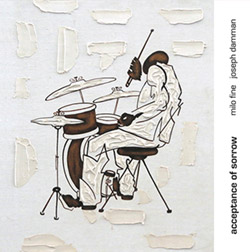
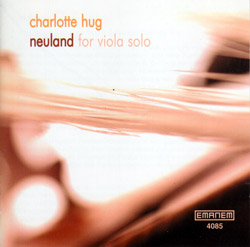
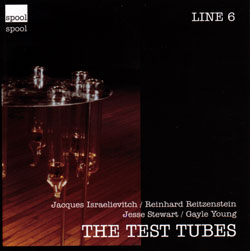
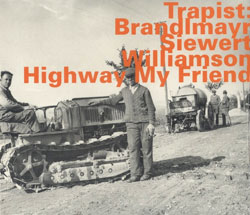
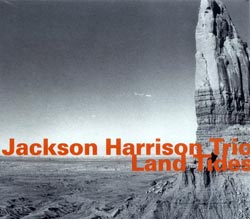




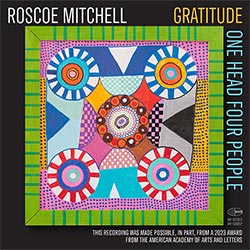
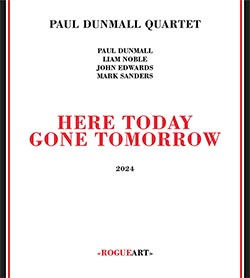
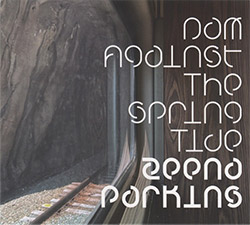
![Weston, Matt: Communism Has Appeared On The Scene [VINYL 2 LPs]](https://www.teuthida.com/productImages/misc4/35546.jpg)
![Coleman, Steve & Five Elements: PolyTropos / Of Many Turns [2 CDs]](https://www.teuthida.com/productImages/misc4/35476.jpg)
![Sorey, Tyshawn (w/ Diehl / Ragahavan): The Susceptible Now [DOUBLE VINYL]](https://www.teuthida.com/productImages/misc4/35477.jpg)


![John Coltrane Quartet (Coltrane / Tyner / Garrison / Jones): Impressions From Graz 1962, Revisited [2 CDs]](https://www.teuthida.com/productImages/misc4/35495.jpg)

![Guy, Barry / Ken Vandermark: Occasional Poems [2 CDs]](https://www.teuthida.com/productImages/misc4/34849.jpg)
![Novoa / Carter / Mela Trio: Vol.1 [VINYL]](https://www.teuthida.com/productImages/misc4/35236.jpg)


![Elephant9 : Mythical River [VINYL]](https://www.teuthida.com/productImages/misc4/34624.jpg)
![Evans, Peter (Evans / Eldh / Black): Extra [VINYL]](https://www.teuthida.com/productImages/misc4/35279.jpg)

![McPhee, Joe: Straight Up, Without Wings [BOOK]](https://www.teuthida.com/productImages/misc4/35454.jpg)
![Jeck, Philip: rpm [2 CDs]](https://www.teuthida.com/productImages/misc4/35455.jpg)









![Barker / Parker / Irabagon: Bakunawa [VINYL]](https://www.teuthida.com/productImages/misc4/35533.jpg)




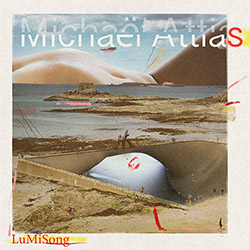
![Blaser, Samuel / Marc Ducret / Peter Bruun: Dark Was The Night, Cold Was The Ground [VINYL 10-inch]](https://www.teuthida.com/productImages/misc4/35492.jpg)






![Warren, Kenny (Warren / Hoffman / Ellman): Sweet World [VINYL]](https://www.teuthida.com/productImages/misc4/35451.jpg)




![Blake, Ran / Dave Knife Fabris: Live Amsterdam 2006, First Visit [CD + POSTCARDS]](https://www.teuthida.com/productImages/misc4/35275.jpg)




![DNS: Taking Big Bites Of The Khandas Three Cafes Deep [2 CDs]](https://www.teuthida.com/productImages/misc4/35334.jpg)




![Cleaver, Gerald: The Process [VINYL]](https://www.teuthida.com/productImages/misc4/34966.jpg)




![Alva Noto: HYbr:ID II [VINYL 2 LPs]](https://www.teuthida.com/productImages/misc4/35201.jpg)

![Baron, Derek / Luke Martin: Distinct and Concealed [CASSETTE + DOWNLOAD]](https://www.teuthida.com/productImages/misc4/35079.jpg)

![Lyle, Erica Dawn : Colonial Motels [CASSETTE + DOWNLOAD]](https://www.teuthida.com/productImages/misc4/35080.jpg)









![Sanna, Claudio: Compositori Sardi Contemporanei II [2 CDs]](https://www.teuthida.com/productImages/misc4/35317.jpg)







![Zurria, Manuel: Fame di Vento [3 CDs]](https://www.teuthida.com/productImages/misc4/35167.jpg)

![Granberg, Magnus / Nattens Inbrott / Skogen: Holde Traume, Kehret Wieder! [2 CDs]](https://www.teuthida.com/productImages/misc4/35038.jpg)
![Frey, Jurg: Outermost Melodie [2 CDs]](https://www.teuthida.com/productImages/misc4/35039.jpg)

![Pavone, Jessica: Reverse Bloom [VINYL]](https://www.teuthida.com/productImages/misc4/34895.jpg)




![Modney (Modney / Wooley / Gentile / Roberts / Pluta / Symthe / ...): Ascending Primes [2 CDs]](https://www.teuthida.com/productImages/misc4/34852.jpg)







![Elephant9 with Terje Rypdal: Catching Fire [VINYL 2 LPs]](https://www.teuthida.com/productImages/misc4/35355.jpg)
![Deerlady (Obomsawin, Mali / Magdalena Abrego): Greatest Hits [VINYL]](https://www.teuthida.com/productImages/misc4/34876.jpg)




![Haino, Keiji: Black Blues [2 CDs]](https://www.teuthida.com/productImages/misc4/35109.jpg)



![Surplus 1980: Illusion of Consistency [CD]](https://www.teuthida.com/productImages/misc4/35069.jpg)
![Staiano, Moe: Away Towards the Light [VINYL + DOWNLOAD]](https://www.teuthida.com/productImages/misc4/35037.jpg)



![Caveira (Gomes / Sousa / Abras / Ferrandini): Ficar Vivo [VINYL]](https://www.teuthida.com/productImages/misc4/34643.jpg)
![Gregg, J. J. / David Van Auken: Lunar Prairie [CD w/ DOWNLOAD]](https://www.teuthida.com/productImages/misc4/34611.jpg)

![Coultrain: Mundus [VINYL]](https://www.teuthida.com/productImages/misc4/32439.jpg)
![Mattin: Songbook #6 [VINYL]](https://www.teuthida.com/productImages/misc4/27317.jpg)
![Punkappella: Wake Up [7-inch VINYL]](https://www.teuthida.com/productImages/misc4/17519.jpg)
![Residents, The: WARNING: UNiNC.: Live And Experimental Recordings 1971-1972 [VINYL 2 LPs]](https://www.teuthida.com/productImages/misc4/31521.jpg)
![Coultrain: Phantasmagoria [VINYL]](https://www.teuthida.com/productImages/misc4/30142.jpg)
![Lennon, Sean Ono: Asterisms [VINYL]](https://www.teuthida.com/productImages/misc4/34517.jpg)

![Coley, Byron: Dating Tips for Touring Bands [VINYL]](https://www.teuthida.com/productImages/misc4/17906.jpg)

![Lost Kisses: My Life is Sad & Funny [DVD]](https://www.teuthida.com/productImages/misc4/lostKissesDVD.jpg)